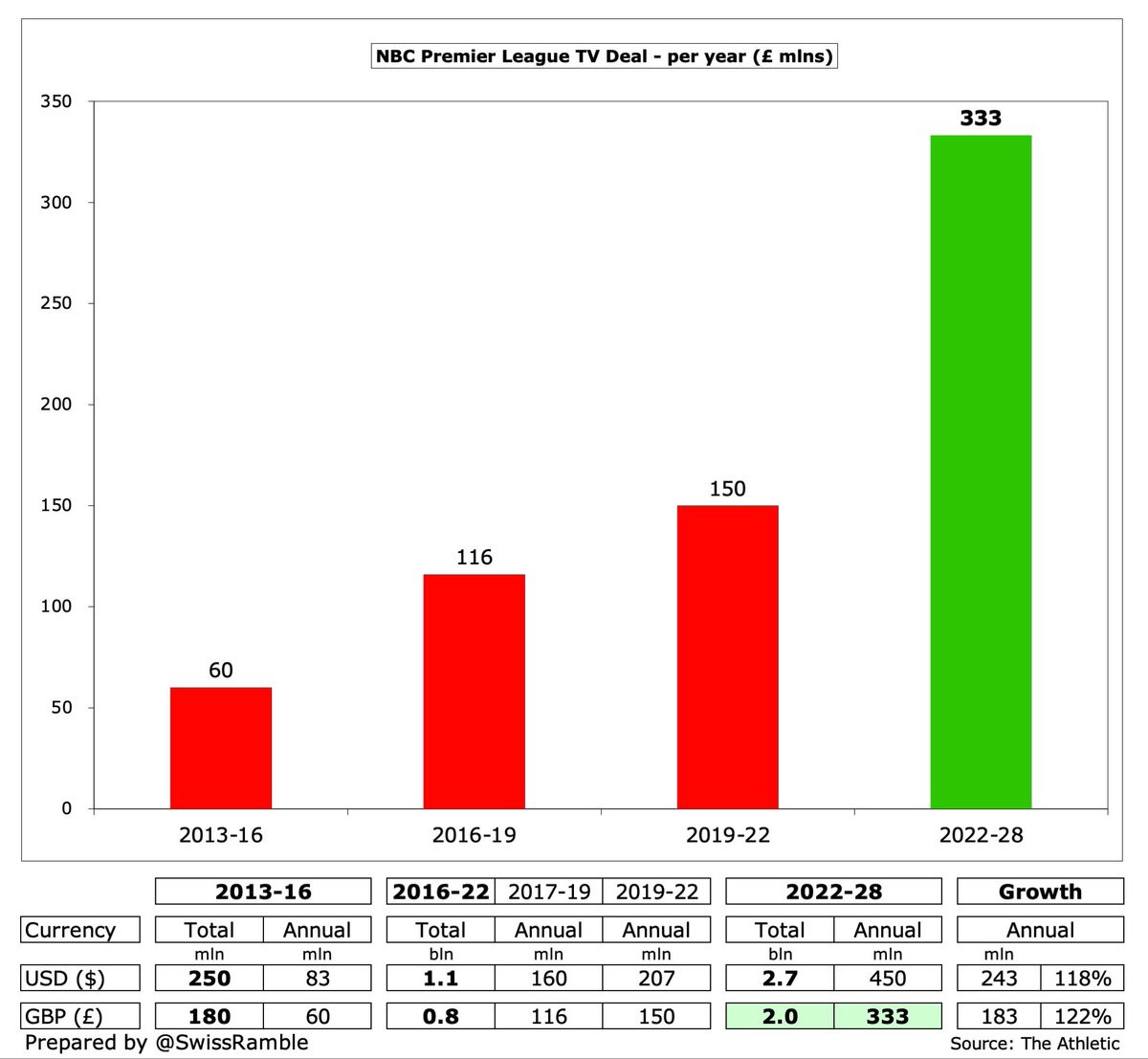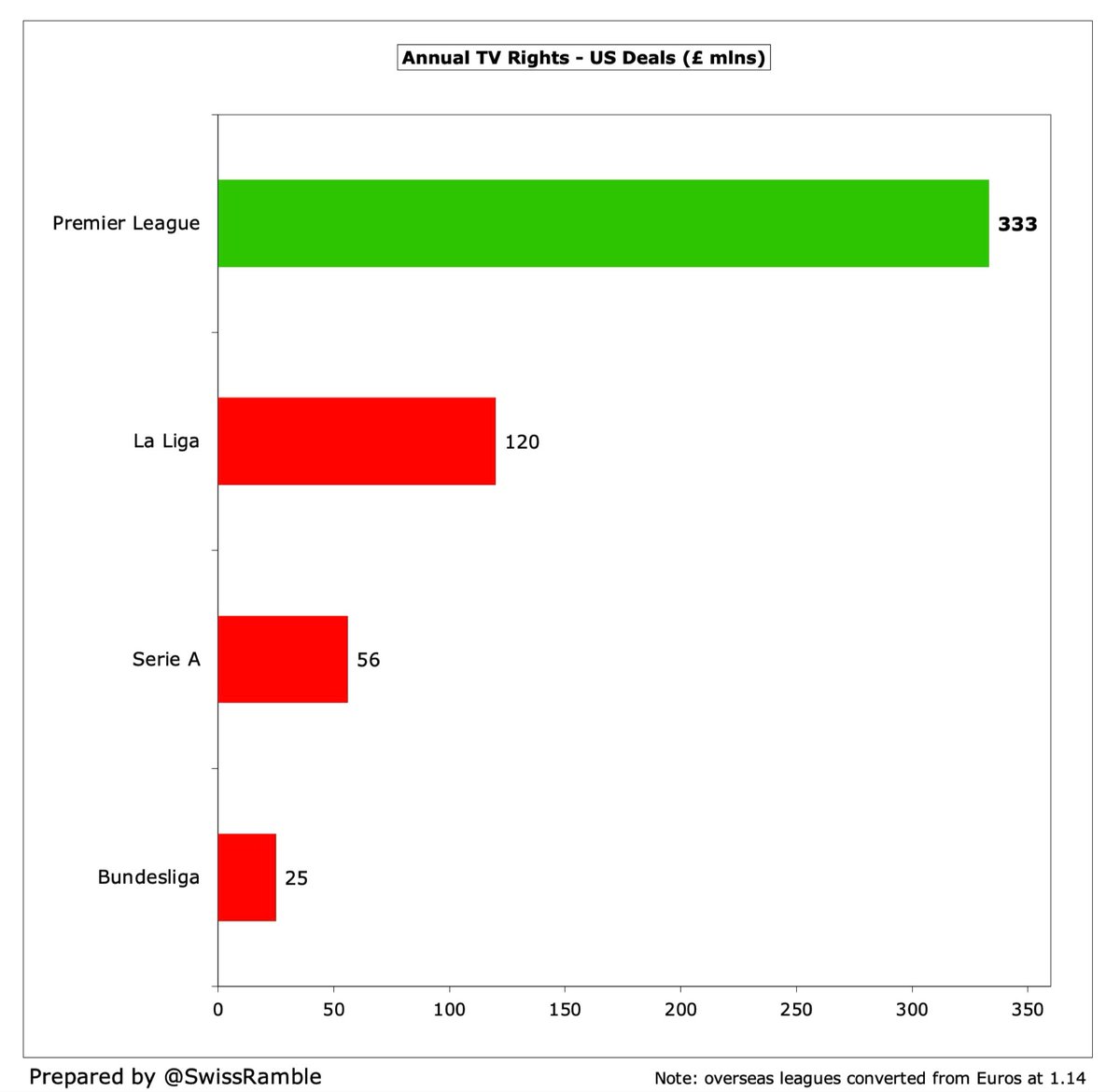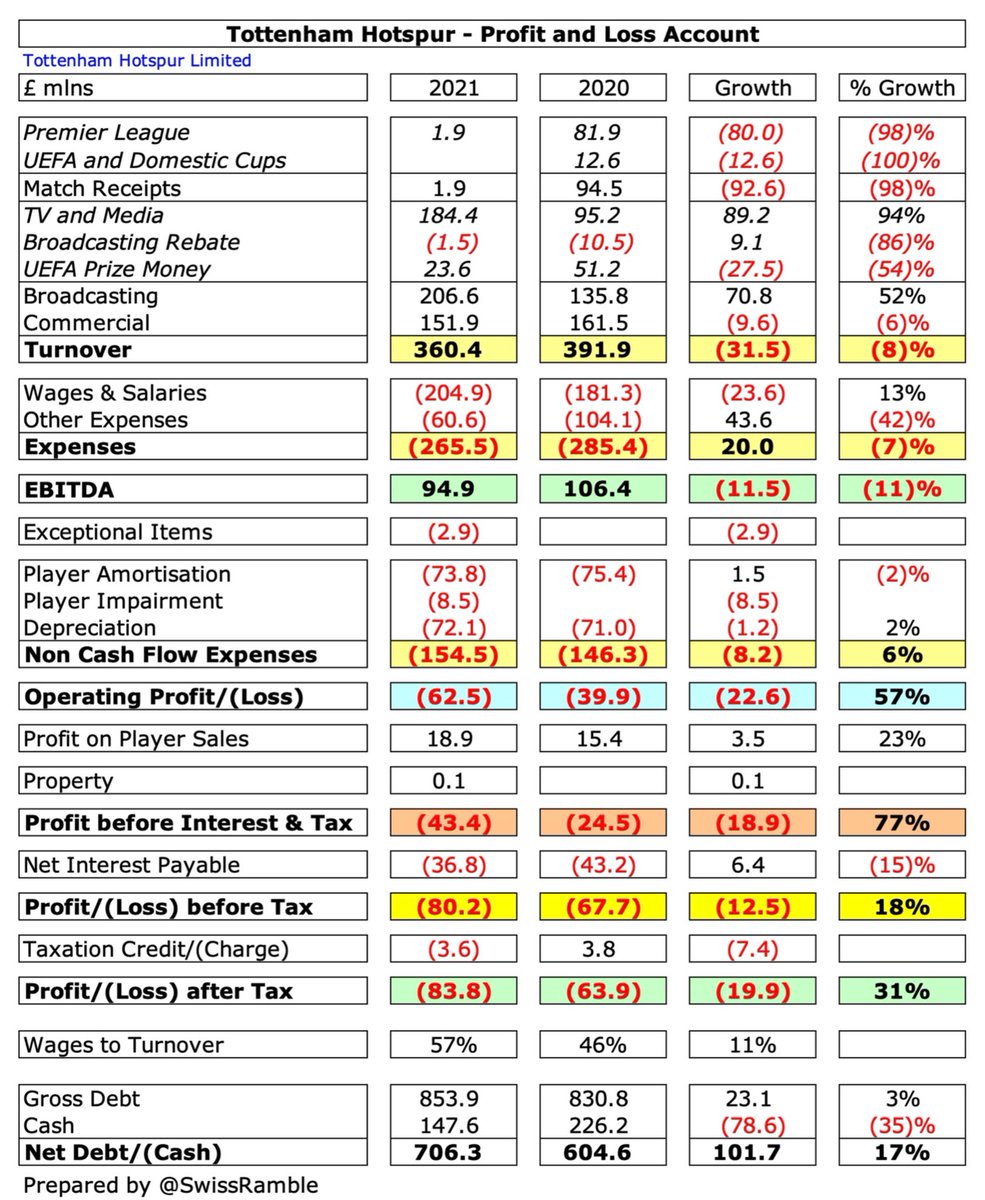
Now that the Champions League 2021/22 group stage has been completed, I thought that it might be interesting to look at how much money the clubs have already received. Spoiler alert: it’s a shedload. Some analysis in the following thread.
This season a new cycle of TV and commercial rights has commenced, while the format of UEFA’s competitions has changed with the addition of the Europa Conference League to the existing Champions League and Europa League, leading to a modified payment distribution.
Total revenue distribution rises by €192m (8%) from €2.540 bln to €2.732 bln. Europa Conference €235m has been funded by this growth, along with a €95m (17%) cut in Europa League (albeit shared between 32 clubs rather than 48), while Champions League is €52m (3%) higher. 

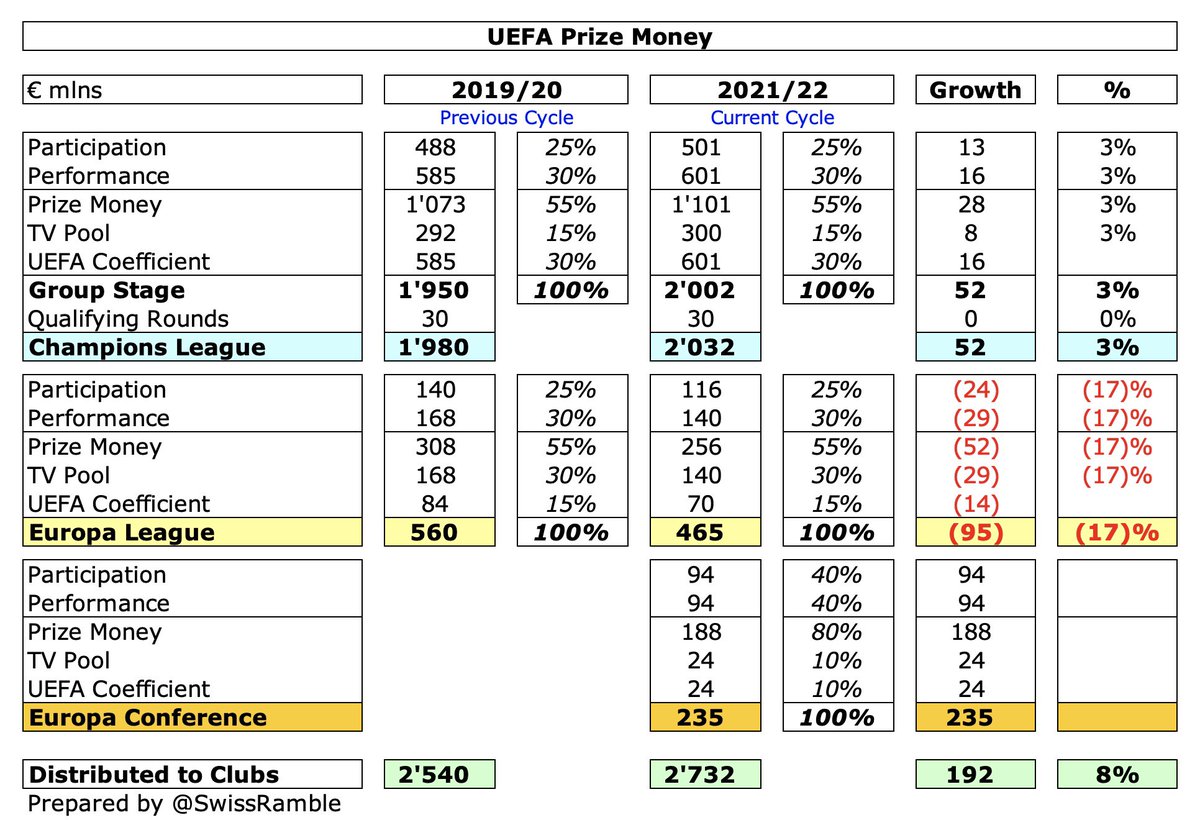

As a result of COVID, revenue in 2019/20 was reduced by €531m with €416.5m impact on participating clubs. This will be deducted in equal shares over five seasons (from 2019/20 to 2023/24) in proportion to each competition. This works out to around 3% of each club’s revenue. 
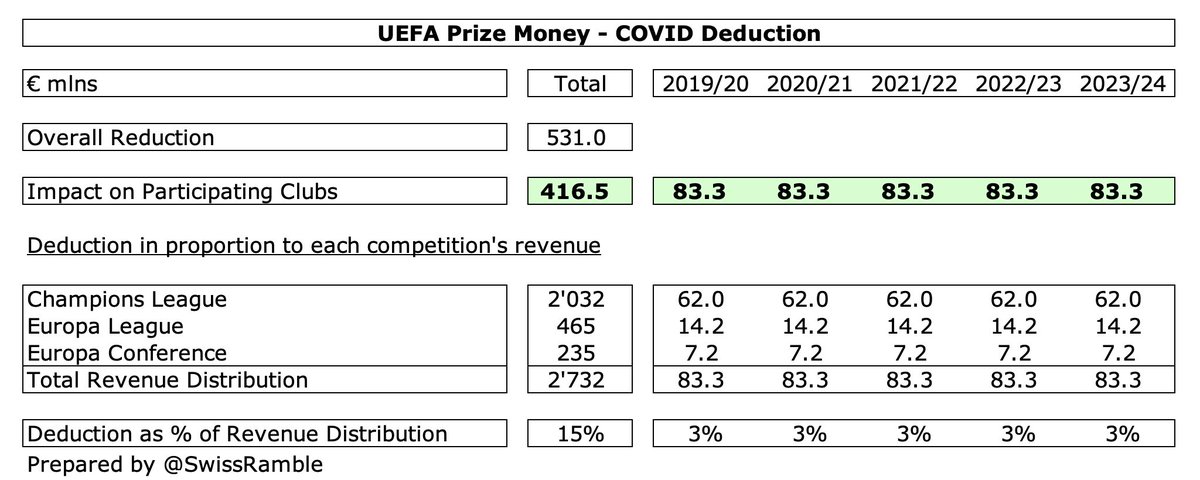
Clearly the Champions League retains the lions’ share of UEFA revenue with its €2.032 bln being nearly 3 times as much as the Europa League and Europa Conference combined (€700m). The difference is particularly stark in the UEFA coefficient (based on 10-year rankings). 
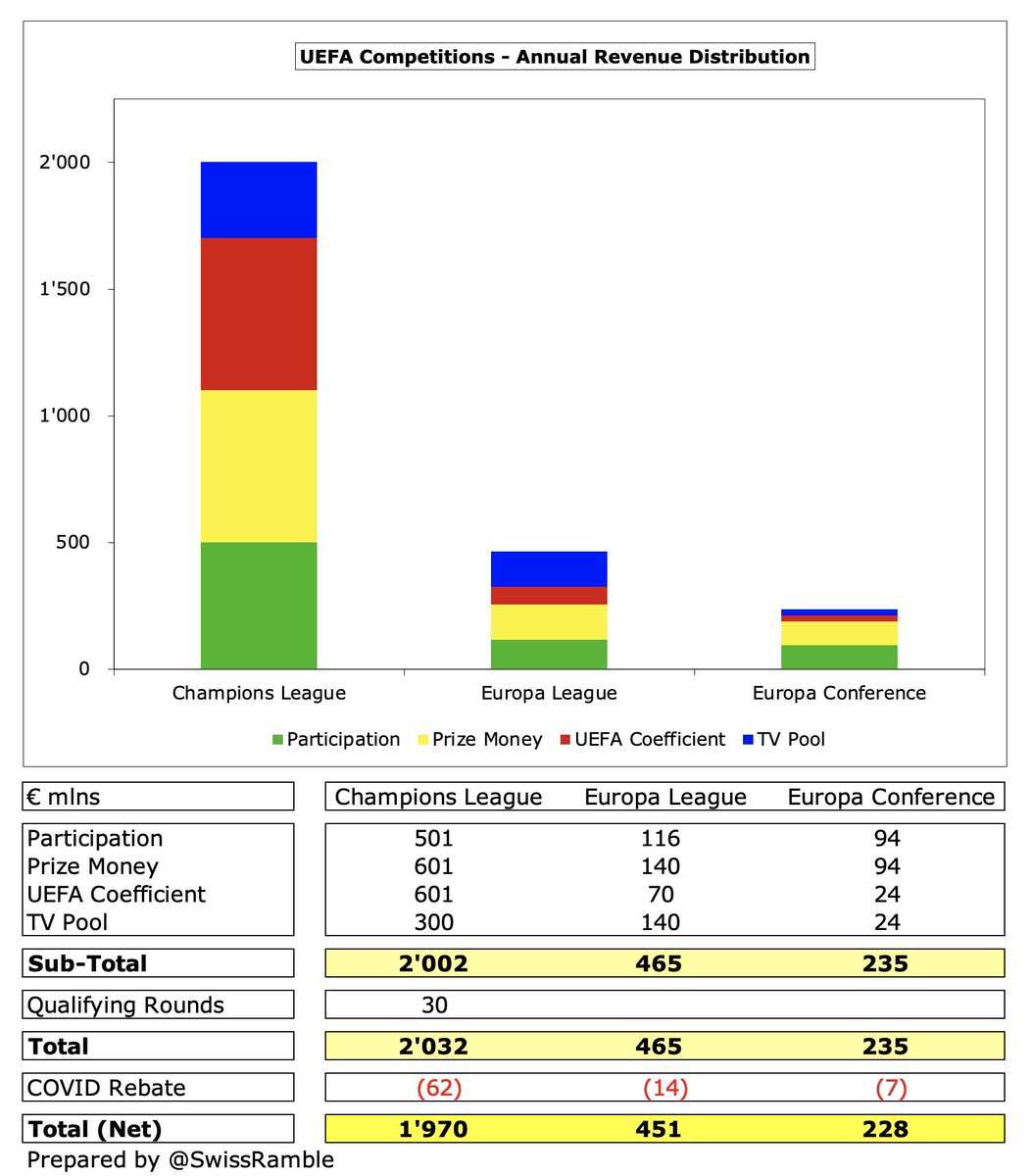
Champions League overall prize money is 3.6 times the Europa League and 5.5 times the Europa Conference, but this varies by round. In general, the difference becomes smaller the further a club progresses, e.g. last 16 it’s 8x and 16x, while for the winners it’s only 2.3x and 4x. 

In 2021/22 each of the 32 clubs qualified for Champions League group stage gets €15.64m plus €2.8m for a win and €930k for a draw. Additional prize money for each further stage reached: last 16 €9.6m, quarter-final €10.6m, semi-final €12.5m, final €15.5m and winners €20m. 

Each of the 32 clubs in Europa League group stage get €3.63m plus €630k for a win and €210k for a draw. Additional prize money: win group €1.1m (runners-up €550k), knockout round €500k, last 16 €1.2m, quarter-final €1.8m, semi-final €2.8m, final €4.6m and winners €8.6m 

Each of the 32 clubs in Europa Conference group stage get €2.94m plus €500k for a win and €166k for a draw. Additional prize money: win group €650k (runners-up €325k), knockout round €300k, last 16 €600k, quarter-final €1m, semi-final €2m, final €3m and winners €5m. 

All numbers in this analysis are certain except the TV pool, which is split into two: (a) half based on position in previous season’s domestic league (known); (b) progress in this season’s European competition (will change). Estimated based on 2019/20 actuals and media reports.
On that basis, I estimate that 9 clubs have already earned more than €75m from 2021/22 Champions League. Bayern Munich lead the way with €96m, followed by Real Madrid €91m, PSG €90m, #MCFC €85m, Atletico Madrid €82m, #CFC €80m, #MUFC €79m, #LFC €79m and Juventus €76m. 

Looking at how Champions League revenue is now distributed, the importance of the UEFA coefficient is clearly evident with TV pool being much less significant than it was before. This rewards historically successful clubs rather than those with larger national TV rights deals. 

Right off the bat, each of the 32 clubs that have qualified for the Champions League group stage receive a participation fee of €15.64m, up 3% from the previous cycle’s €15.25m. 

Bayern Munich and #LFC have earned the highest prize money to date with €27.7m, as they won all 6 games in the group stage, which was worth €16.8m (€2.8m for each win), plus €1.3m for their share of the money left on the table after draws and €9.6m for reaching the last 16. 

Coefficient payment is based on performances in UEFA tournaments over past 10 years, including bonus for winning tournaments, so benefits traditional big clubs like Real Madrid €36m, Bayern €35m & Barcelona €34m. English clubs: #CFC €33m, #MCFC €28m, #MUFC €27m & #LFC €23m 

Champions League clubs clearly benefit most from UEFA coefficient payments, as these are significantly lower in the Europa League (#LCFC €1.2m and #WHUFC €1.1m) and the Europa Conference (#THFC €1.4m). Some have argued that this is UEFA’s way of preventing a Super League… 





Highest TV pool payment is Lille €31m, followed by PSG €28m and #MCFC €22m. Lille benefit from the French TV pool only being divided between 2 clubs with their share being higher than PSG as they won Ligue 1 last season. In contrast, Spain’s money is split between 5 clubs. 

Even though #LFC have the best record in this season’s Champions League, their €79m revenue is lowest of English clubs, due to UEFA coefficient & TV pool (finished 3rd in 2020/21 Premier League). #MCFC €85m is highest for the same reasons, followed by #CFC €80m & #MUFC €79m. 

Revenue is much smaller in the Europa League, where #WHUFC have earned €24m to date, including €1.1m bonus for winning their group and reaching the last 16, while #LCFC have €22m. English TV pool is very important to earnings here (this is a modeled figure). 

Similarly, I have estimated that #THFC will only receive €10m from the Europa Conference League. This assumes that UEFA will award victory to Rennes for the match postponed due to COVID, so this could well change. Either way, it’s not big money in this competition. 

The comparison between English clubs across the three European competitions highlights the massive disparity with all four Champions League clubs earning around €80m to date, nearly four times as much as the Europa League clubs, who are in turn twice as much as Europa Conference 

Real Madrid have the highest Spanish clubs’ Champions League 2021/22 revenue to date with €91m, due to having the best UEFA coefficient (highest in Europe) and the most prize money, followed by, Atletico Madrid €82m (highest TV pool after winning La Liga last season). 

Spain have benefited from UEFA coefficient payment, thanks to a very successful record in Europe with its clubs filling 3 of the top 5 rankings. Villareal’s €55m revenue is restricted, as receive nothing from first half of TV pool, due to qualifying by winning Europa League. 

Bayern Munich’s €96m is the highest German clubs’ Champions League 2021/22 revenue to date, due to earning the most prize money, having the best UEFA coefficient and highest TV pool. There is a big gap to Borussia Dortmund €61m, RB Leipzig €44m and Wolfsburg €36m. 

Bayern were boosted by winning all 6 games in the group stage (worth €2.8m each), and being the only German club to reach the last 16. Low UEFA coefficients for RB Leipzig and Wolfsburg. TV pool reportedly up 70% following new deals with DAZN, Amazon and ZDF (replacing Sky). 

Juventus’ €76m is the highest Italian clubs’ Champions League 2021/22 revenue to date, due to having the best UEFA coefficient and earning the most prize money, followed by Inter €63m (highest TV pool after winning Serie A last season), Milan €45m and Atalanta €33m. 

Atalanta’s €33m revenue is relatively small, mainly due to a low €5m UEFA coefficient, which shows how this distribution model protects the traditional large clubs against the up-and-coming teams. TV pool is reportedly down from €50m to €40m in this cycle. 

Paris Saint-Germain have the highest French clubs’ Champions League 2021/22 revenue to date with €90m, due to earning the most prize money and having the best UEFA coefficient, followed by Lille €67m, boosted by the highest TV pool after winning Ligue 1 last season. 

Both French clubs boosted by reaching the last 16 and high TV pool, as this is only split between 2 clubs, whereas other countries have to share between 4-5 clubs. Lille earnings dampened by only €2m from their UEFA coefficient, compared to a hefty €30m for PSG. 

Benfica’s €53m is the highest Portuguese clubs’ Champions League 2021/22 revenue to date, as they score well in every category, despite not being the highest in any of them, followed by Sporting €45m (highest prize money) and Porto €43m (best UEFA coefficient). 

Portuguese clubs suffer from having a very low TV pool (unless this has been increased, though I could not find any details). On the other hand, this means that they have benefited from the introduction of the UEFA coefficient: Porto €24m, Benfica €22m and Sporting €11m. 

It should be emphasised that these are only estimates, specifically including assumptions around TV pools, while final revenue will depend on progress in this season’s competition, but the analysis should give a good idea of the money that can be earned in the Champions League.
What is clear is that Champions League qualification is more lucrative than ever – and this reinforces the financial strength of the leading clubs in the top Leagues. Huge revenue from the CL makes qualification more likely, which then generates more income. Rinse and repeat.
• • •
Missing some Tweet in this thread? You can try to
force a refresh





